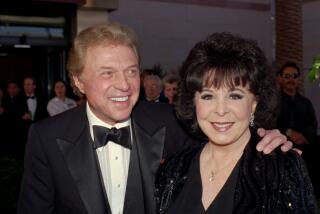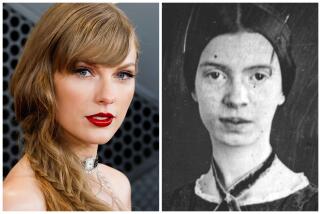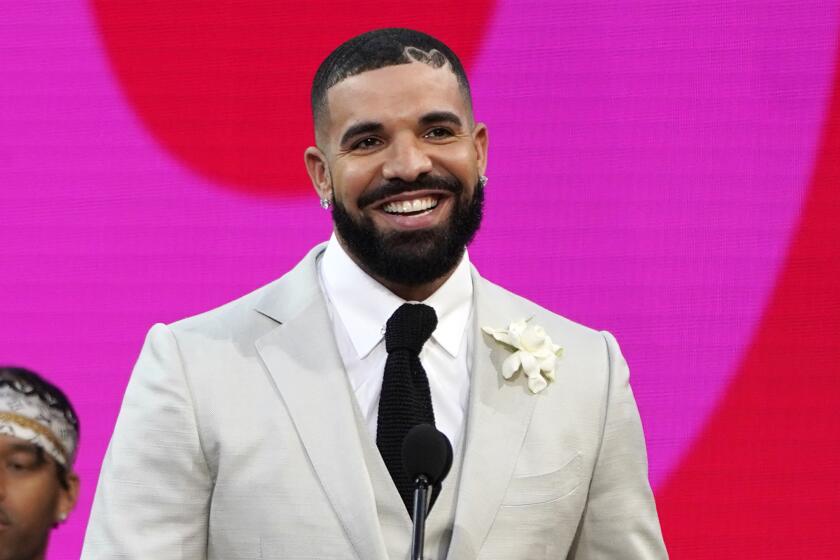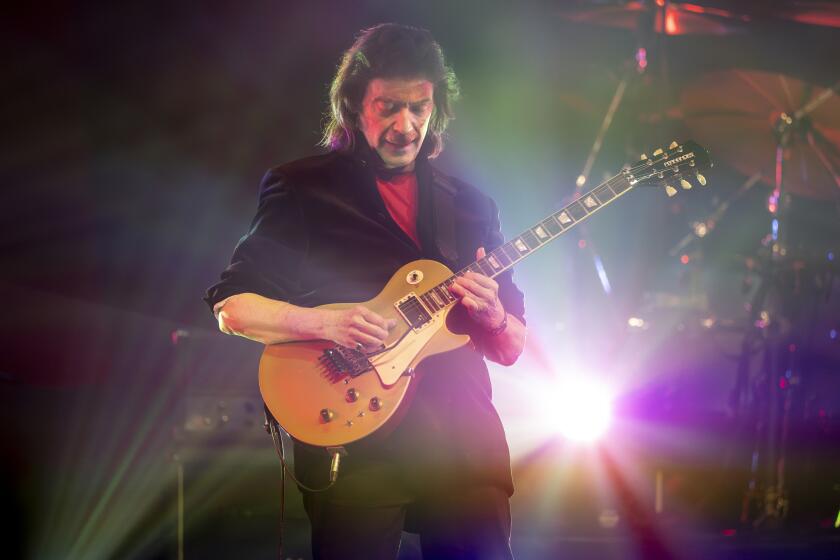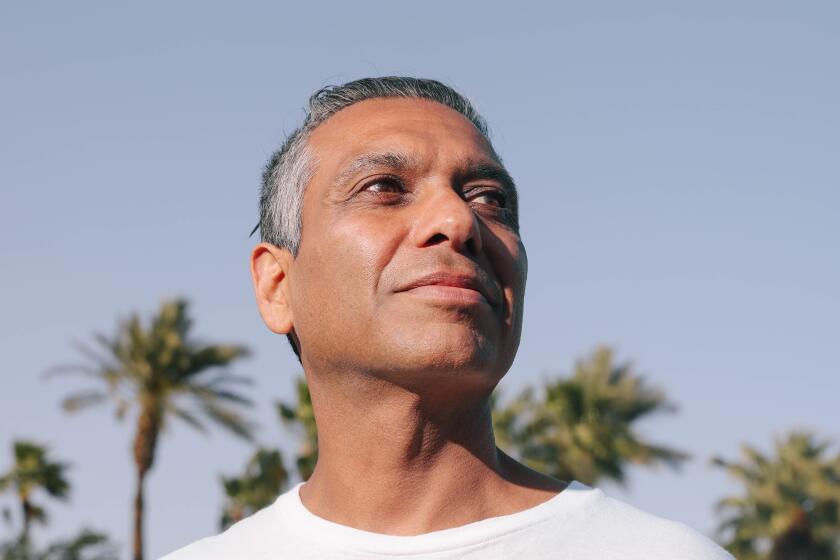‘Born to be his conduit’: Jennifer Warnes remembers her friend and collaborator Leonard Cohen
For many, the singer Jennifer Warnes will be forever linked to Leonard Cohen because of her 1987 album of Cohen interpretations, “Famous Blue Raincoat.”
With backing from Cohen and musicians including Van Dyke Parks, Stevie Ray Vaughan, bassist Roscoe Beck and others, Warnes brought to life Cohen’s songs with the affection of a portraitist painting a paramour.
Warnes had known Cohen, who died last week at age 82, since 1971. Then 22, she met him — where else? — in the lobby of a hotel.
Best known for her classic duet with Joe Cocker, “Up Where We Belong,” Warnes went on to appear on half a dozen Cohen albums, some as vocal arranger. Her distinctive voice serves as a foil on songs including “Tower of Song,” “Ain’t No Cure for Love” and “The Guests.” She’s among the choir on the original version of “Hallelujah” as well.
In the studio, Warnes witnessed firsthand Cohen’s approach to songwriting and during two world tours watched as he presented his work and charmed crowds.
I made a decision to become an artistic friend, a creative friend rather than a romantic friend because there was no way I could be his only girl.
— Jennifer Warnes
For “Famous Blue Raincoat” she recorded nine Cohen songs that expanded the notion of how his work could be interpreted. (An anniversary reissue added four more recordings from the time.)
Warnes and Cohen remained close for 45 years. The Times spoke to her after news of Cohen’s passing was announced. Below is a condensed and edited transcript of that conversation.
When did you first meet Leonard Cohen?
I met Leonard when I was 22 in Hartford, Conn. We were in the lobby of the hotel, both going to two separate concerts. Later, I was in Nashville and someone sent me a message saying did I know anybody who wanted to sing background on the next Leonard Cohen tour.
I was doing a television show with Waylon Jennings. I said, “Yeah, send me!” I was sent over to Columbia, and I sang for [producer] Bob Johnston and Leonard.”
Do you remember what you sang?
I knew most of the music that had come off the first two records. I had been singing at the Troubadour his music already — “I Lit a Thin Green Candle” [titled “One of Us Cannot Be Wrong”] and “Dress Rehearsal Rag.” The more dire and dark, the better in those days for me.
So I sang those a cappella and they said, “Get your passport.” It was during that time that I fell in love with him and realized that the line of women was longer than I could deal with. I made a decision to become an artistic friend, a creative friend, rather than a romantic friend because there was no way I could be his only girl.
I put all my energy into the music and that developed into a serious, full-time creative friendship by about ’74 or ’75.
What album?
“Recent Songs.” Henry Lewy asked me to create choirs for him, so I started to do these overlays and these Beach Boys-type of [vocal] stacks. I began to understand that the voice could be an atmosphere, or a scrim, or a curtain behind him that suggested otherworldly places.
I developed this way of draping his songs and it always worked. Our voices were so opposed in tone, and I had so much light and he had this warm dark thing going in. So it worked. And from that rose a friendship that lasted 45 years.
Can you describe the collaborative process? Did it occur in the studio after he had finished with the song?
Generally, he would give me a cassette with his song in its raw form, probably with that little keyboard or guitar — whatever was basic to a songwriter sketch. He would send it to me and say, “Do you like this? Tell me what you hear.”
I began to understand that the voice could be an atmosphere, or a scrim, or a curtain behind him that suggested otherworldly places.
— Jennifer Warnes
Often I didn’t like some of it — and then I would love some of it. So I’d say, “Well, I can really get into this one, but that one I just hear nothing.”
Was this in Los Angeles or New York?
Well, I had a little time with him during the Phil Spector period [in New York], but my fiance had been shot and killed in South Central Los Angeles, and it was a really difficult time. Not a time for singing.
[Leonard] rescued me from that and helped me through that. But most of our invention happened in the late ’70s, early ’80s, up until “Famous Blue Raincoat.” Once I started “Famous Blue Raincoat,” it was my concept, in a way, so I kind of ran with that one.
I just recently sang in December on some stuff, and it wasn’t used. It wasn’t strong. It wasn’t right.
Were you in the studio with him at those last sessions?
Yes. He showed up and he was dressed up with a tie and came out to see me. And we had some beautiful moments.
Do you remember what you talked about, if I might ask?
It’s too personal.
In recording your album “Famous Blue Raincoat,” did he give you his blessing, or or did it not work that way?
Oh, yes, he gave me his blessing. He came to the sessions. He wrote “Ain’t No Cure for Love” for the project. It was a comment after we both had read the L.A. Weekly [story] about AIDS. We took a walk around the block. I said, “Gee, it’s getting so people can’t even love one another anymore. Just die from it.” And he said, “There ain’t no cure for love.”
In the 1980s, he started veering into using more synthetic sounds.
That’s right. He had a little Casio thing at the house, and it gave him control. He has these old Jewish rhythms that his mother loved that would be from the klezmer world. He loved to evoke those, and then he would just create on top of that beat. It sounded like home to him.
The last time I saw him perform, I was really struck by those klezmer influences. I hadn’t fully understood that until I heard the music live.
And you notice that in the last record that he’s made, there’s use of the choir from his parents’ temple, and the rabbi that sings “Hineni, Lord, I am here,” in the old cantor style. This has been something really important to him. Definitely “The End of Love” is very rooted in that feeling.
It’s probably hard to pick one, but what are your favorites?
I have no favorites. My favorites are my friendship with the man himself. I don’t care about the music on some level. I care about the man. I care about the man and what he gave and what we stood for. What he showed and how he led, with gentleness and kindness and tenderness.
And how he respected women, the overwhelming gentleness always shocked me because I was raised in a rougher universe. I came from that situation where men didn’t treat women well, so to be around somebody so overwhelmingly gentle, you kind of put everybody else on the back burner.
I wanted to be around him because I wanted to be around that radical kindness. And I think people sensed that he was like that, but as a woman to be around that? It was the reason why everybody wanted to be his girlfriend or his boyfriend or whatever.
He was revolutionary in the stance that he brought to the world. So the music is gorgeous and the body of work is huge. And, you know, he is Dylan’s equal.
But I would say when all is said and done, what I’m going to remember are a few tones of voice and the look in the eyes and his impeccable timing when you were in pain, those kinds of things.
I’ll remember that I woke up from a surgery to see him in there sleeping in the hospital, and I’ll remember him at my mother’s funeral. That’s what I’ll remember.
If we make it to another century, his songs will be spoken of and still referenced. I firmly believe that.
Oh, absolutely, yes. And he knew. He sacrificed his personal needs for that body of work to exist and to live. And so we have it. It’s the greatest gift of an artist, just to leave all of this. So you’re right. His body of work will survive.
I think anybody who spends any time by their hi-fi speakers listening to what he really meant inside of a song, they’ll get the gift. The deep humanity in it is going to be missed.
Do you still have those cassettes that he sent you with his songs sketches?
Sure do!
We need to talk! Thank you so much for taking time to remember your friend.
You know, I wrote him a letter about a month ago. He wrote me back this beautiful letter. I said, when it’s all distilled and understood, I think I was, among other jobs, really just born to be his conduit. I was born to be an instrument that he played. And I was born to bring the inner sound of what he did out. That’s it.
I’m like the waitress. I’m bringing the food. But I didn’t grow the food, you know? And I can think of no more beautiful job than to have loved him and supported him and known him. That to me is like a very fulfilling feeling. There’s no emptiness when I think of him.
There’s a lot of terrible music out there. For tips on the stuff that’s not, follow Randall Roberts on Twitter: @liledit
ALSO
Leon Russell dies at 74; hit songwriter, Wrecking Crew member, musical bridge builder
What did Leonard Cohen really mean when he sang ‘Hallelujah’?
Artists, collaborators plan David Bowie 70th-birthday celebrations
Leonard Cohen dies at 82; singer-songwriter of ‘Hallelujah’ had a literary sensibility
More to Read
The biggest entertainment stories
Get our big stories about Hollywood, film, television, music, arts, culture and more right in your inbox as soon as they publish.
You may occasionally receive promotional content from the Los Angeles Times.

